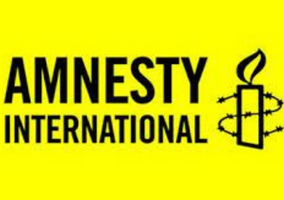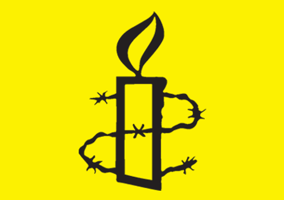Sacha Deshmukh joined Amnesty International UK after an exodus of its former leadership team following racism and bullying allegations at the organisation.
He joined on an interim basis in May 2021 before being appointed as a permanent replacement in June 2022.
An inquiry into the charity found that it exhibited “institutional racism” and had failed to “properly embed equality, inclusion and anti-racism” practice.
Now, Deshmukh says the charity is working on becoming a truly anti-racist organisation.
“I was brought in when there was a bit of an organisational crisis as the issues to do with racism had become public,” he says.
“And I say it that way around, because actually, the crisis was really the inherent issues rather than just them becoming public. The issue wasn‘t the news coverage. The issue was the issue itself.”
Amnesty had ‘not really evolved for a decade’
When he arrived, Amnesty’s external human rights work “positively amazed” Deshmukh but he felt its internal operations had “frozen”.
“The organisation in the way that it worked and ran had not really evolved in any way for a decade or so before I arrived.”
He believes this was one of the underlying drivers behind the issues at the charity, which allowed institutional racism and bullying to spread.
While issues may have existed beforehand, Deshmukh says that during the decade before his arrival there had been no “proactive, intentional work” to improve its culture.
One of the first things Deshmukh did when he became chief executive at Amnesty was acknowledge the truth of the allegations.
“I think that’s sometimes what charities struggle with. They go: ‘Is this an issue of reputation?’ No. A reputation is the result of an issue of substance; it’s not a thing in and of itself.
“The people who have raised their hands and had the courage to say there are problems in this organisation have pointed to actual problems that are either deeper or affect more people than just the people who’ve raised their hands.”
With reports of bullying in the organisation as well, Deshmukh says this was an “extremely damaging manifestation” of the issues that presented themselves at Amnesty.
Amnesty now aims to tackle the causes of bullying and institutional racism rather than just treating their symptoms, he says.
Deshmukh says the charity aims to create a “very empowered culture”, which is “the opposite of a bullying culture”.
Mission and culture interlinked
Deshmukh says Amnesty’s cultural transformation must involve its external work on human rights as well as its internal workings.
“The two things interlink, because I don’t believe you can do the first well if you aren’t also really trying to transform yourself on the second.
“We have very significantly transformed our focus on not just race but other areas where discrimination tends to be very prevalent.”
Deshmukh says that a couple of years ago, Amnesty would have been the type of organisation to have tweeted Black Lives Matter; but if prompted on how they were trying to address racial issues, it would have provided an answer with little substance.
“It’s not enough to say we’re doing a lot everywhere and I’m sure it gets soaked up in everything that we do. It actually should be driving you.
“We need to be the kind of rigorous organisation about how we run ourselves in the same way that we’re actually very rigorous, very evidential, very organised about our human rights work, and you need to put that under a really clear direction or goal as well.”
‘21 years is too long for anyone to run an organisation’
Deshmukh took over as Amnesty UK CEO from Kate Allen, who has led it since 2000.
“My predecessor was around for 21 years and I think for 10 years did a great job of running it as an organisation. But perhaps 21 years is a long time.
“Now it’s natural for anyone over a 21-year period, in the second part, to focus more on the issues in the outside world only.
“And I don’t think I would have the imagination to reinvent the way an organisation ran 10 years into running it. So, it’s not a criticism that that person somehow should have been able to do that. I think 21 years is too long, personally, for anyone to lead an organisation.”
Deshmukh is on a fixed-term contract of eight years, an arrangement that was introduced with his appointment, after which he says the charity will “need something fresh”.
He says that organisations can struggle to evolve without diversity of thought and perspective.
“I think it’s very, very difficult to be deeply involved in a quite complex ecosystem for around a decade, and then be the one who imagines how that could be different. I think you’d have to be superhuman to be able to do both of those things.”
Taking accountability
Deshmukh believes a lack of strong decision-making contributed to the issues that occurred within Amnesty UK, and thinks this could be a sector-wide issue.
“Even though the organisation was quite conflict-ridden before, there was an absence of leadership willing to make decisions.
“You might say ‘how strange’ because if it had all of those problems, you would have assumed that it was somehow an autocracy of decisions being made, but actually it wasn’t.
“It was an absence of both responsibility and sufficient accountability. I don’t think the leaders in the organisation felt empowered to or indeed practice making decisions and colleagues wanted people to – but they also wanted them to be clear and open and transparent and then be able to buy into that judgement.”
Amnesty becoming more accountable for its decision-making has been part of its culture change, Deshmukh says.
“It takes two to tango but one person has to stand on the dancefloor first. And at the end of the day, if you’re a leader that’s what you’ve been asked to do. You know you’re getting given that responsibility.”
Deshmukh says staff have responded positively to changes made over the past few years.
He quotes an internal survey in which the number of staff saying they would recommend Amnesty UK as a place to work went up by 23 percentage points to 75% between June 2022 and December 2023.
‘Charities sleepwalk through their growth’
Charities can sometimes employ a brilliant issue expert as their leader and mistakenly expect this means they have the skillset to run the organisation, Deshmukh says.
As charities grow in size, leaders must make choices to maximise this, he says, with grassroots organisations that start with a few people sometimes growing to have hundreds of employees.
“Charities do sleepwalk through their growth. And did that affect Amnesty as much as any other charity? I’m sure it did.
“There are massive achievements as you grow and they should be congratulated. But you have to think about what helps an organisation evolve from the point where there are 20 of you to when there are a couple of hundred of you.
“If you become deeper and more mature and broader, not everyone has the skills to run something bigger than when it’s a handful of you round a kitchen table.”
Messages for other charities
Deshmukh is thankful for the people who shared their negative experiences of Amnesty International UK, as it has meant the organisation has been able to examine itself more deeply, he says.
“I’d say to the sector as a whole: don’t think it’s somehow isolated to some individuals who didn’t find their experience at Amnesty what they delivered. It wasn’t even isolated to the experience at Amnesty. We had to recognise it as something deeper here.
“But to the rest of the sector, I’d say, actually think about how any organisation like ours might end up where we are. And I think it is those things like drifting through your growth and thinking about delivering the next fundraising project.
“Of course, it’s both those things, but then do you actually think about what it’s like to manage the business plan, to have your structures and skills you need in place? Most people probably just think that will flow behind those first two, rather than give it the same depth of thought.”











